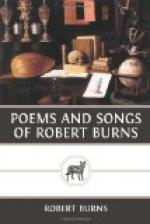Glenriddel Hermitage, June 28th, 1788.
Thou whom chance may
hither lead,
Be thou clad in russet
weed,
Be thou deckt in silken
stole,
Grave these maxims on
thy soul.
Life is but a day at
most,
Sprung from night, in
darkness lost:
Hope not sunshine every
hour,
Fear not clouds will
always lour.
Happiness is but a name,
Make content and ease
thy aim,
Ambition is a meteor-gleam;
Fame, an idle restless
dream;
Peace, the tend’rest
flow’r of spring;
Pleasures, insects on
the wing;
Those that sip the dew
alone—
Make the butterflies
thy own;
Those that would the
bloom devour—
Crush the locusts, save
the flower.
For the future be prepar’d,
Guard wherever thou
can’st guard;
But thy utmost duly
done,
Welcome what thou can’st
not shun.
Follies past, give thou
to air,
Make their consequence
thy care:
Keep the name of Man
in mind,
And dishonour not thy
kind.
Reverence with lowly
heart
Him, whose wondrous
work thou art;
Keep His Goodness still
in view,
Thy trust, and thy example,
too.
Stranger, go! Heaven
be thy guide!
Quod the Beadsman of
Nidside.
To Alex. Cunningham, ESQ., Writer
Ellisland, Nithsdale, July 27th, 1788.
My godlike friend—nay,
do not stare,
You think the phrase
is odd-like;
But God is love, the
saints declare,
Then surely thou art
god-like.
And is thy ardour still
the same?
And kindled still at
Anna?
Others may boast a partial
flame,
But thou art a volcano!
Ev’n Wedlock asks
not love beyond
Death’s tie-dissolving
portal;
But thou, omnipotently
fond,
May’st promise
love immortal!
Thy wounds such healing
powers defy,
Such symptoms dire attend
them,
That last great antihectic
try—
Marriage perhaps may
mend them.
Sweet Anna has an air—a
grace,
Divine, magnetic, touching:
She talks, she charms—but
who can trace
The process of bewitching?
Song.—Anna, Thy Charms
Anna, thy charms my
bosom fire,
And waste my soul with
care;
But ah! how bootless
to admire,
When fated to despair!
Yet in thy presence,
lovely Fair,
To hope may be forgiven;
For sure ’twere
impious to despair
So much in sight of
heaven.
The Fete Champetre
Tune—“Killiecrankie.”
O Wha will to Saint
Stephen’s House,
To do our errands there,
man?
O wha will to Saint
Stephen’s House
O’ th’ merry
lads of Ayr, man?




